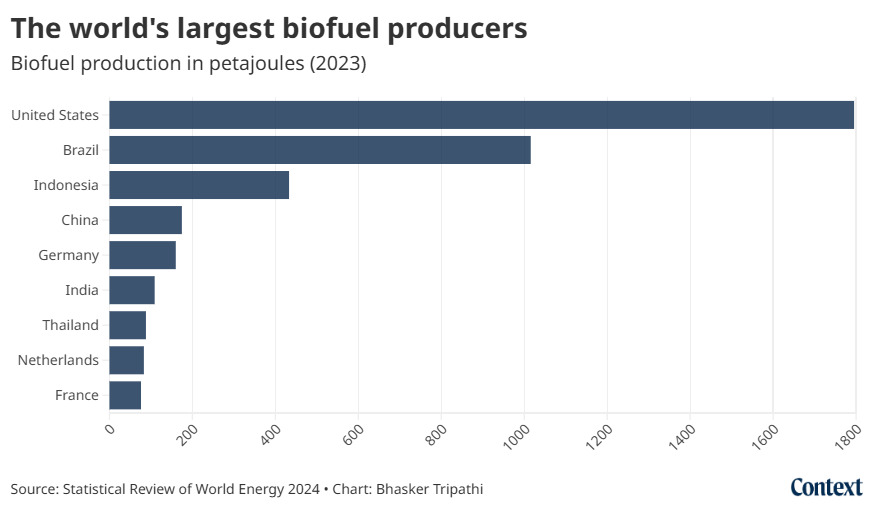 | Know better. Do better. |  | Climate. Change.News from the ground, in a warming world |
|
| | A big betWaste cooking oils. Sugarcane. Corn.
The world can make fuel out of this stuff. And what's more, it can displace high-polluting fossil fuels in vehicles without building new machines.
Led by the United States and Brazil, many countries are investing billions into biofuels that promise to make travel by road, sea and air greener.
So, what's the catch?
In a word: land.
As my colleague Bhasker explains in a new story this week, biofuels emit fewer pollutants when burnt, and can often directly replace fuels that power more than 90% of global transport.
But getting hold of the biomass to create these fuels requires huge amounts of land.
This often pits them both against agricultural land required to feed growing populations, and forests essential in the fight against climate change. .png/640w) Thomson Reuters Foundation/Bhasker Tripathi |
And that's not to mention all the cultivation, fermentation, distillation and transportation involved in producing biofuels - they require fossil fuels.
In India, the push to increase ethanol production for fuel led to the country using 2.5 million tonnes of rice from its national stores – rice that was meant for impoverished communities.
In Indonesia, meanwhile, there are concerns that national targets for biofuels like palm oil could transform vast swathes of crucial rainforests and other ecosystems into plantations, our correspondent Adi Renaldi reported. |
Off the scaleSo, which is worse for the climate? High-polluting fossil fuels or biofuels?
It depends how the biofuel is made.
Waste cooking oils, for example, could provide a cleaner alternative to diesel. But they won't power the world's trucks, ships and planes.
Biofuel production increased nine-fold between 2000 and 2020. In 2023, nearly 200 million metric tons of bioethanol and biodiesel were produced globally.
National biofuel policies and mandates - such as a certain percentage of biofuels in vehicles - require land on a major scale.  An engineer holds a pile of insects before pressing them into biofuel and alternative protein, at Circa Biotech, in Al Ain, United Arab Emirates, January 14, 2025. REUTERS/Amr Alfiky |
Under the world's current land-use
regulations, CO2 emissions from biofuel production exceed those from fossil diesel combustion, according to a study published in Nature last year.
Without international agreements to comprehensively protect natural land, it said, biofuels cannot make an effective contribution to achieving climate goals.
So next time you hear about sustainable fuels, ask them where it came from.
See you next week,
Jack |
|
|
|